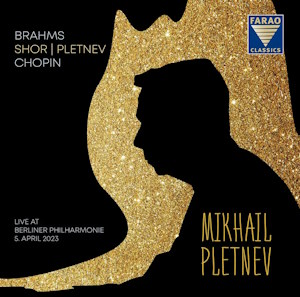
Mikhail Pletnev (piano)
Live at Berlin Philharmonie
Johannes Brahms (1833-1897)
Three Intermezzi, Op 117 (1892)
Alexey Shor (b. 1970)/ (b. 1957)
Piano Sonata in A minor (2019 rev. 2021)
Frédéric Chopin (1810-1849)
Polonaise in C-sharp minor, Op 26 No 1 (1836)
Fantaisie in F minor, Op 49 (1841)
Barcarolle in F-sharp minor, Op 60 (1845-46)
Polonaise-Fantaisie in A-flat major, Op 61 (1845-46)
rec. live, 5 April 2023, Main Auditorium, Berlin Philharmonie, Berlin
Farao Classics B108125 [75]
That this disc opens with enthusiastic applause quickly interrupted by the first notes of Brahms’ E flat intermezzo will give you some idea that Pletnev’s recital is not going to be run of the mill and that is confirmed as we travel into the world of Brahms’ op.117, lullabies of my grief as he described them when he returned to writing solo piano works in 1892. Pletnev has an improvisatory approach to tempo, extremely pliable being perhaps the most moderate way to express it, and a penchant for dramatic contrasts where they have not been heard before. A bar at the end of the first section of the third brought out of the texture as if it were a pivotal moment in the piece. The Poco piú lento of the same piece suddenly strong and powerful right through to the change to A major, the Tempo I immediately after this fortissimo instead of pianissimo and much of the rest played in a hushed intimate manner eschewing swells of dynamics. In the central section of the second there is an impressionist veil over the demi semiquaver writing, flowing across the keyboard like some ghostly cadenza before the return of the opening music. The other side of the coin is that Pletnev can’t help but make a beautiful sound and I am envious of his silky legato and the stillness that he maintains over long phrases.
His Chopin is calculated to divide opinion – deeply personal or simply wayward? Certainly the fantasy elements of both the Fantaisie and the Polonaise-Fantaisie are emphasised and I can’t say I have heard either piece played like this before – probably fair to say that that can be said of any of the Chopin or Brahms items played here. Meaningful pauses before new sections, inner voices tugged out of the texture even from the most ordinary of accompanying figures and, in the polonaise, an all too frequent loss of the basic pulse, fantasy winning out over dance. There are obviously a thousand and one ways to approach the opening of this piece and for the most part I am happy with Pletnev but then he follows the ruminative opening passages with a sudden military snap at the a tempo giusto that would not be out of place were it not quite so light-hearted, dare I say twee? He proceeds more successfully and there is lots to enjoy but beware – the famous trill passages are dispensed with fairly summarily, Chopin’s growing into each trill ignored in favour of simply adding the next new note to the chord trill and after a magisterial coda the left hand trills jump in like angry hornets. It is a similar story in the Barcarolle and C sharp minor polonaise though the latter is not quite so pulled about; I have to say I liked the inner voice he brings out in the left hand at the end of the lyrical heart of this early polonaise.
The centrepiece here is the Sonata in A minor by Alexey Shor, a Ukraine born composer who now lives in the States. It was written in 2019 and Pletnev discovered it in 2021. Finding its harmonic and melodic style mirrored his own creative palette he approached Shor with some ideas about the work which the composer eagerly accepted and the sonata you hear is the result of this collaborative effort. It is resolutely tonal and melodically attractive; I hear faint elements of Medtner at times, especially in the opening which sounds like one of the skazka though Shor’s music has more of a folk-like tint to it. There is no doubt that the late romantic Russian writers have influenced Shor’s writing and it sounds wonderfully pianistic. The opening movement has a contrapuntal feel at times with the interweaving of decorative lines while the short slow movement is reflective, its questioning upper keyboard figurations contrasted with a refrain in the middle register. The finale opens as a quirky triple time dance that gradually wraps itself in fine decoration before a chordal passage introduces darker hued music. After a cadenza like passage the opening theme returns but stripped of its jaunty quirkiness, its figurations more along the lines of a Rachmaninov étude-tableaux. It’s an interesting piece and if, like me, you are attracted to romantic piano writing then you shouldn’t be put off by the very recent composition date; it’s not going to set the world on fire but the live audience appreciated it and Pletnev gives it his all.
I have pointed out many issues with these performances but I hope that I have balanced it out with some positive response. For all his Brahms and Chopin is different he is a masterful pianist and while I listened to this with many a raised eyebrow I was as often caught off guard by some beautifully spun phrase, an unusual but convincing interpretative choice or drawn in by a breathtaking pianissimo. Pletnev is still a force to be reckoned with and if you are happy to take the rough with the smooth I would say that this is a journey worth taking.
Rob Challinor
Buying this recording via a link below generates revenue for MWI, which helps the site remain free



















